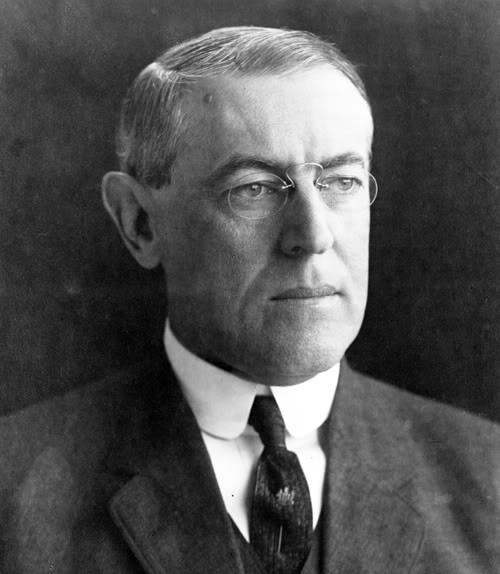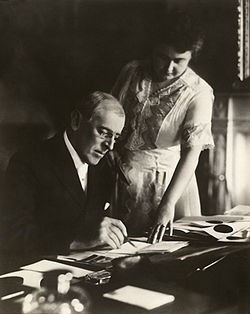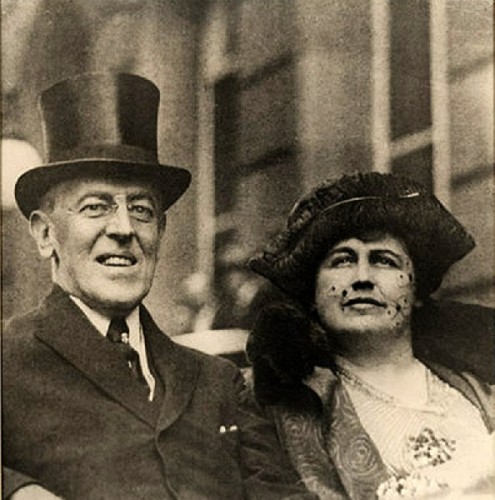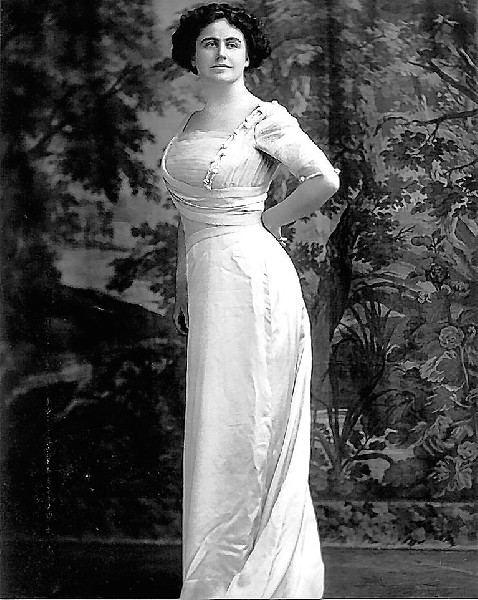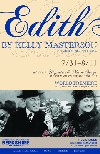Edith a Premiere by Kelley Masterson in Stockbridge
From First Lady to Madam President
By: Charles Giuliano - Aug 05, 2012
Edith (World Premiere)
By Kelley Masterson
Director, Michael Sexton
Scenic Designer, Brett J. Banakis; Costume Design, David Murin;
Lighting Designers, Paul Gallo, and Craig Stelsenmuller; Sound Designer, Jill BC DuBoff; Wig Designers, Rob Greene and J. Jared Janas; Casting, Alan Filderman; Stage Manager, Stephen Horton
Cast: Jayne Atkinson (Edith Bolling Galt Wilson), Dan Butler (Thomas Marshall), Jack Gilpin (Woodrow Wilson), RJ Hatanaka (Edmund Starling), Walter Hudson (Henry Cabot Lodge), Peter Rini (Joseph Tumulty), Steven Skybell (Cary Grayson), Samantha Soule (Margaret Wilson)
Berkshire Theatre Group
The Fitzpatrick Main Stage
Stockbridge, Mass.
July 31 through August 11, 2012
The historical drama Edith which is having its world premiere on The Fizpatrick Main Stage in Stockbridge through August 11 is a thoroughly entertaining, superbly acted, and stunningly produced evening of theatre.
While the audience was drawn into and delighted by the play most knew little or nothing about President Woodrow Wilson (1856-1924), performed by Jack Gilpin and even less about his astonishing second wife, Edith Bolling Galt Wilson, (1872-1961) played by Jane Atkinson. Under extraordinary circumstances, with the cooperation of the attending physician, Dr. Grayson (Steven Skybell) she denied access to his bedside. With the president fighting for his life Edith morphed from First Lady to Madam President.
In 1919 Wilson, who had his first heart attack in his 30s, succumbed to a stroke. For a period of six weeks Edith served as President by conveying his “wishes” or how she interpreted them. Administration officials, cabinet members, Vice President Thomas Marshall (Dan Butler), and even Wilson’s daughter Margaret (Samantha Soule) were never informed of the severity of his stroke. He was paralyzed on one side, barely able to speak, and blind in one eye.
Eventually, there was a limited recovery where, confined to a wheel chair, he was able to attend cabinet meetings in which he had little active participation. Relying almost entirely on the support of his wife, under these amazing circumstances, he served the remainder of his term from 1919 to 1921. For the final three years of his life they lived in Washington, D.C. Out of office he made only a couple of public appearances. She sustained his memory and was active in the Democratic Party until her death in 1961. Their home is now open to the general public.
"Woodrow was really incapacitated (by the stroke), which means that someone was really running things," the playwright Kelly Masterson told a reporter. "I'm making a little bit of a leap of faith. I think my play is about 75 percent history and 25 percent drama."
I beg to differ with those percentages. Not that I debate the historical detail. But it seems that Masterson mostly harvested the low hanging fruit. The play presents the Wilsons as an endearing couple. The performances by Atkinson and Gilpin are charming and adept but present personas that hardly jibe with the individuals they portray.
My interest in the Wilsons started with the epic, scathing, insightful “Mr. Wilson’s War” (1962) by John Dos Passos. While Wilson may be regarded as a visionary who proposed but failed to execute the formation of a League of Nations, in many other aspects, he was less than admirable.
A native of Virginia he was an ardent Presbyterian, segregationist, some say racist, a ruthless opponent of dissent and the radical left.
At the time of his nomination on the 46th ballot of the Democratic convention he was the Governor of New Jersey. From 1902-1910 he had been the President of Princeton University. When Theodore Roosevelt failed to gain the nomination of the Republican party he bolted and formed the Bull Moose Party. The Republican candidate was William Howard Taft. In this three way race Wilson earned 41% of the popular vote with 435 votes in the Electoral College from 40 States. He narrowly won a second term on the campaign slogan “He kept us out of the war.”
Because of relentless German submarine attacks on American shipping Wilson was forced to ask for a Declaration of War. He instituted the first draft since the Civil War including African Americans who were confined to all black battalions with white officers. Mostly they were deployed as non combatants.
Once committed to war he crushed all opposition. Wilson pushed through Congress the Espionage Act of 1917 and the Sedition Act of 1918. He enabled arresting and deporting foreign-born radicals. Some sixty newspapers were deprived of their second-class mailing rights and effectively banned from the U.S. Postal Service. Criticism of the Wilson administration and its war policy became grounds for arrest and imprisonment.
Antiwar groups, anarchists, communists, International Workers of the World (I.W.W. or Wobblies) and radical labor movements were regularly targeted by agents of the Department of Justice. Eugene Debs, the Socialist Party leader and labor activist, was arrested after he gave a speech opposing the war. Wilson called Debs a "traitor to his country". Many recent foreign immigrants who opposed the war were eventually deported to Soviet Russia or other nations under the sweeping powers granted in the Immigration Act of 1918.
The Wilson administration's attempts to silence radical political opponents continued after the war, culminating in the Palmer Raids, a mass arrest and roundup of some 10,000 anarchists and labor activists led by Wilson's Attorney General, A. Mitchell Palmer. The Palmer Raids were eventually stymied in June 1920 by Massachusetts District Court Judge George Anderson, who ordered the discharge of 17 arrested aliens. He wrote that "a mob is a mob, whether made up of Government officials acting under instructions from the Department of Justice, or of criminals and loafers and the vicious class.” Of the 10,000 persons arrested in the Palmer raids, 3,500 were held in detention, of which 556 were eventually deported to other countries.
In view of these historical conundrums it was difficult of just sit back and enjoy a feel good, revisionist take on Wilson aided and abetted by his feisty wife. The historical Wilson, in my mind, was an academic, autocratic idealist, intellectual, Presbyterian prig, bigot, repressor of dissent and human rights. That’s surely not how Gilpin portrayed him.
While Wilson had been grieving the loss of his wife for six months it is difficult to grasp his infatuation with the boisterous, strong willed, adventurous Edith. She took him for rides in her electric car one of the first in the city. Wilson it seems was fascinated by automobiles and was instrumental in constructing more roads. But given his priggish, academic, reserved demeanor it is confounding to see him so smitten with Edith whom Atkinson plays with over the top energy and enthusiasm recalling Kathy Bates and her Unsinkable Molly Brown in Titanic.
Love, it seems, conquers all. Edith is produced as a charming romance with a soupcon of politics playing out on the world’s stage. In an arch and stretched out manner it may be viewed as farce and a variation of a bedroom drama. It surely had the five, slamming doors.
While watched with historical reservations it was absorbing to be swept along by the stagecraft of this production. The sets by Brett J. Banakis were astonishing. There were constant adjustments from anti chamber, to intimate bedroom, a stump speech, parade in Paris, to the Oval Office. All done seamlessly.
There were mood and period leaps with cleverly staged flashbacks as a part of some 50 or so individual scenes. Under the direction of Michael Sexton the complicated plot and action with its numerous asides flowed effortlessly.
The minor or supporting characters were developed effectively. A flawless RJ Hatanaka made the most of the Secret Service Agent Edmund. He was drawn in and ruthlessly exploited by Edith as well as recruited as a go between and agent for the Secretary of State Joseph Tumulty (Peter Rini). On many levels he was the most sympathetic character on stage.
As the weak, vacillating, loyal pawn in the game, Vice President Thomas Marshall, was played with wonderful skill and wit by Dan Butler. While just a heart beat away from the Presidency in the view of his opponent Edith he was “measuring the curtains in the Oval Office.” It is truly remarkable, given Wilson’s condition and extended incapacitation, that it never happened. The extreme circumstances caused the later passage of the 25th Amendment.
The villain in this politically one dimensional drama is the Republican leader in the Senate, Henry Cabot Lodge (Walter Hudson). He had the temerity to stand up to Wilson and opposed a clause in the charter for the League of Nations that empowered it to go to war against non compliant nations. He viewed this as an erosion of American sovereignty. In opposing the bill to ratify the League of Nations he insisted that only Congress has the power to declare war.
The historical Wilson viewed the Constitution as outdated and restrictive preferring the British Parliamentary system of governance.
The play correctly reveals that the League of Nations would have been likely to pass with compromises. As Marhall wisely observed it would be best to get it up and running and then make changes.
It is precisely here that Edith proved to be more of the loyal wife, sticking to his stubborn resistance to compromise, than astute politician. Her ersatz Presidency, while fascinating and the inspiration for this sympathetic play, was a tragic failure. Her inept interference, however engagingly portrayed by Atkinson, altered the course of history. And not for the better.
For an enjoyable evening of theatre by all means see this play.
For a more accurate understanding of a complex chapter in American history dig deeper. Wilson and Edith’s failures and abuses paved the way for the next war to end all wars. His attack on trade unions and the radical left crushed the socialist movment and made dissent a crime against democracy. During the Great Depression the defunct I.W.W. made way for the Communist Party of American. Which, during the post WWII era, was witch hunted by McCarthyism. The American left, especially with the national shift to the far right we see today, never recovered.
That's the true legacy of Woodrow and Edith.


